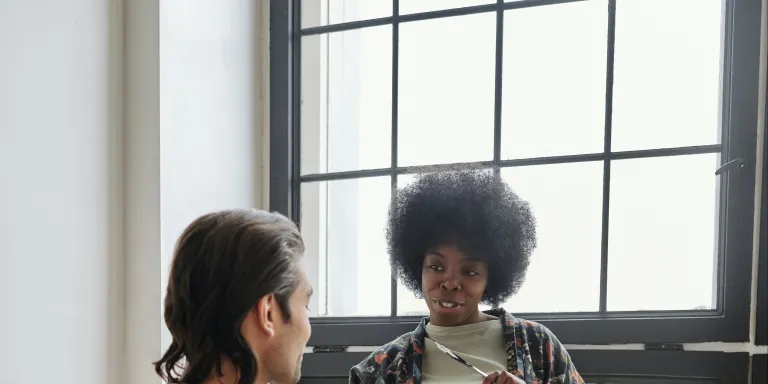
As a relationship therapist, ‘conflict’ and ‘communication’ are words I often hear. Most clients I see come for two reasons – they recognise that something in the relationship isn’t working – and they want change, explains Relate therapist, Sandhya Bhattacharya. Differences (and negotiating them!) are key to any relationship. If partners are from different cultures, there can be an added layer of complexity involved in building mutual understanding.
Understanding Culture
In my experience, culture is something we acknowledge but find hard to understand. This isn’t surprising, given that culture is hard to define. The Encyclopedia Britannica tells us that ‘culture’ is unique to humans, that it includes, “language, ideas, beliefs, customs, codes…rituals, and ceremonies”. In other words, culture is a part of who we are. It's so entwined in our conscious and unconscious selves, that we can’t always separate the ‘cultural’ from the ‘individual.’
Culture in relationships
Culture can influence relationships in various ways. This ranges from how you negotiate finances to your relationships with family members. If you’re in an inter-faith relationship, religion is often another factor to consider. These differences can feel overwhelming but clients often tell me they are a reason why they found the other person ‘interesting,’ ‘different,’ or ‘exciting in the first place.
Working with cultural differences
Understanding these belief systems is important for anyone in an inter-cultural relationship. This is because one partner may have no context when it comes to interpreting the other partner’s needs. Take for example, the case of Rich and Zoya*, who couldn’t agree on how they would like to spend holidays. Zoya, who came from a large family in Eastern Europe, remembered long summers and Christmases at her grandparents, who hosted an ‘open house’ for an assortment of aunts, uncles, cousins and neighbours. Rich, on the other hand, was brought up in an estate in England, by a busy mother and frail grandmother, with no memory of a father figure.
Family, for Rich, was “over-rated and stressful.” He much preferred hanging out with friends and couldn't understand why Zoya complained about being “lonely” in London when they both had busy careers and several groups of mates. But for Zoya, family was a space where she was truly loved and supported. Although she enjoyed living in London, she didn’t feel she fully belonged and so was never ‘home.’ Zoya couldn’t understand why Rich didn’t seem to enjoy spending time with her family and was instead irritable after a few days.
While she was initially hurt and felt Rich was ‘rejecting’ her and her family, Zoya later understood that he had painfully different memories of holidays and family time. As the couple moved away from a pattern of hurt and anger, they were able to re-negotiate what was important for each of them, and how they would spend leisure time.
Celebrating difference
One of the many benefits of working with inter-cultural relationships is seeing how much partners learn from each other. It’s a privilege to see relationships where partners share that their children speak three different languages or where they show curiosity and pride about each other's heritage.
Choosing to be with someone who is culturally different already demonstrates a sense of curiosity and empathy; an ability to appreciate a different point of view. While most relationships require us to acknowledge differences in character, intercultural relationships challenge us to honestly explore and celebrate these beliefs. Working through them can build resilience and trust between partners, creating honest, healthy and loving relationships in the long run.
Our tips for navigating intercultural relationships:
-
Understanding your partner and your relationship is a process; take the time to actively listen to each other.
-
Listening does not mean agreement, but it does acknowledge that your partner holds a different – and valid – perspective.
-
We all battle conscious and unconscious biases which will emerge in cross-cultural relationships. Acknowledging bias is the first step towards building mutual understanding and respect.
-
You and your partner will hold different values but framing these differences as ‘right’ or ‘wrong’ won’t encourage a partnership. Exploring these values from a place of curiosity allows us to understand what these differences mean to us, so that we can work together in negotiating them.
-
Finally, remember that the couple is the expert on their relationship. Family and friends may ‘know’ them well, but each relationship is unique to its partners, and needs its own space to be nurtured.
Sandhya Bhattacharya is a therapist and clinical supervisor, working with adult relationships, families, and young people. She is passionate about understanding mental health and its impact on relationships.
*Examples taken from an amalgamation of several different client experiences to protect anonymity.
How we can help
If you’re looking for support with your relationships, we can help. We offer a range of ways to speak with a trained relationship expert including ongoing counselling, 30 minute web and phone chats, and one session therapy.
Find out which service is right for you
How you can help
Have you found this advice helpful? Make a donation to help us reach more people and continue supporting the nation’s relationships:
Can't afford to donate? We understand. Instead, we ask that you leave us a 5 star review on Trustpilot.